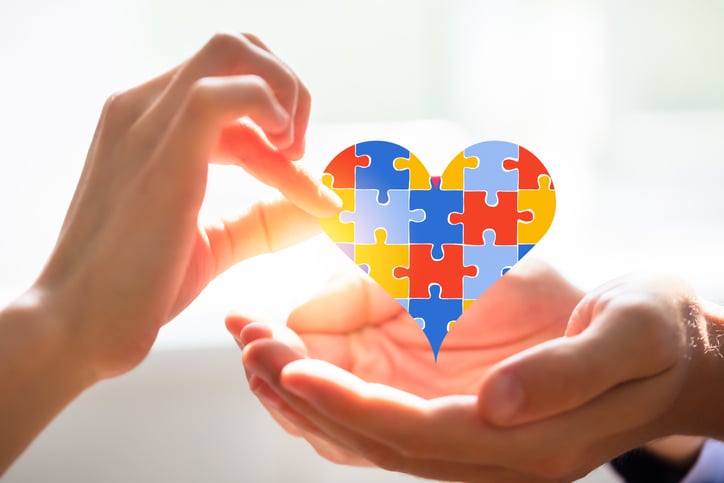Autistic Vs. Having Autism:* The Importance of Labels
Meanings we attach to words can have a huge impact, influence, and change the attitudes and tones of conversations. “Autistic person” and “person with autism” may have the same definition theoretically, but their meanings are significantly different. Self-advocates and allies of autistic people use the term “autistic” because they understand that autism is a part of someone’s identity. Just as orientation, religious affiliation, and racial and ethnic categories are part of our identities. It truly impacts our whole lives and how we are seen.
|
Most of us prefer if you say we are autistic, implying that it is who we are. We are proud and want to be accepted because we are different, not less. |
"With Autism" Language
Parents and professionals use the term, “with autism” because they don’t consider it a part of identity and don’t wish their children to be identified or labeled by that, insinuating it is negative, like having a disease. They use “person-first” identifiers to emphasize humanity in the kids vs. the label. However, ultimately it is pathologizing part of someone's individuality. People don't say person-first language when talking about positive traits, for example, people don't say “student with intelligence” they say “intelligent student.”

Saying “with autism” implies that it is separate from the person. This has been quite damaging and led to some harmful assumptions about autism. “With autism” is almost like an accessory, and this is important to note because in media we see autistic people whose traits are simply used as a plot device to aid neurotypical people around them. In Rain Man, we see Raymond serving the sole purpose of teaching his brother to be a better person and be kind. In The Good Doctor, we see Shaun is tolerated and accepted by his peers only because he offers his exceptional knowledge in his special interest in medicine. In the first episode, we see him getting escorted out of the hospital by security, and it's only after someone decides to listen to his advice that he is even allowed into the building to interview for his job. They held a board meeting and were even arguing as to why he shouldn't be considered due to being autistic.
Imagine this situation as if it were your child. They worked so hard, graduated college, and completed medical school top of their class, and then they were denied a job based on something they couldn't change about themselves. Imagine how all that they could have offered, and the lives they could have saved because of their different way of seeing things, was never even known because a board decided they shouldn't be around people. It's heartbreaking when you think about it but for us it is reality. I've been denied jobs I've been more than qualified for because I end up in an awkward situation where I have to either explain I'm autistic and possibly not get the job based on discrimination, or I enter an interview process where I forget to make enough eye contact, or not smile enough, or not have good enough answers to questions that deal with conflicts in the workplace because I have a harder time with social interactions.

When you use the term “has something” it can imply that it can be corrected, fixed, healed, or even that their less desirable traits can and should be decreased to make others around them more comfortable. The problem with this is our brains process information differently, and this affects us every day for our whole lives. Even if we learn how to hide less desirable traits by masking, we still can struggle significantly in ways that might not even be obvious at first. So, most of us prefer if you say we are autistic, implying that it is who we are. We are proud and want to be accepted because we are different, not less.
"Autistic" Language
Being autistic is not a negative thing. Each person, autistic or not, has something they can offer the world and each person will go through struggles. The shame around the word is something we actively look to change. Certain autism organizations have had a hand in creating fear and misinformation around autism. In a recent documentary, one of the parents interviewed even went so far as to say that she had intentions of murdering her autistic child and killing herself as well, just because she was autistic! In the same film, they claimed that having an autistic child will lead to a miserable life where you will most likely end up divorced and your family will be torn apart.
The reality of the situation is we have so many things we can learn by actually listening to autistic people. Instead of speaking for them, hear their ideas out. Give them a voice. The differences in our minds are something that should be celebrated and encouraged. I was watching my child the other day stacking puzzle pieces on top of each other instead of using them in the “correct” way and at first, I worried that my children wouldn’t do things the way they should and then quickly realized that they don’t need to. Because it’s exactly the sort of thinkers that do things “outside the box” that end up coming up with unique solutions to problems that neurotypical people might not have thought of.
Examples of Autistic Outside-the-Box Thinkers
A great example of this is Alan Turing a cryptanalyst that broke the “unbreakable” Nazi code and is considered the father of computer science. Another contemporary example is Hannah Gadsby, whose Netflix comedy special Nanette reshaped the tired tropes of standup comedy while giving people an honest perspective on being an autistic woman. And Naoki Higashida, a non-verbal 13-year-old autistic who wrote The Reason I Jump, a best-seller turned into a Netflix film, that lets people into the mind of non-verbal autistics and gives insight into their thoughts and how they feel.
When in doubt, just ask. And respect the person’s choice to identify how they wish. The best thing we can do to support autistic people is to give them their voices back and ask them lots of questions. Ask them what support and services they wish to have, ask how they would solve an issue, ask how they feel about how they are represented, and most importantly hire autistic people in places that aim to support autistic people. Their answers and ideas could surprise you.
*A Note from Stages Learning: Whenever possible Stages Learning uses the preferences stated by an individual as to whether to use identity-first (“autistic person”) or person-first (“person with autism”) language. In a poll of 21,000 people, 69% preferred identity-first language, and 31% preferred person-first language. A thought piece by Northeastern University indicated that in the majority of cases, autistic people themselves prefer to be called autistic people, whereas caregivers and professionals prefer the wording “people with autism.” We agree with the Northeastern article that the group being talked about should be able to dictate what they are called. As we move forward we plan to alternate our usage in our written materials and in our speech. We recognize the importance of this issue to so many people and we plan to revisit this issue in the coming years with the expectation that preferences will likely continue to shift and we will do our best to reflect these changes. We welcome your thoughts on this issue. Please feel free to contact us.

Tori Lehinger
Tori Lehinger is from Spokane, WA and an autistic mom of twins who are in the process of getting diagnosed. She is a content creator for Stages Learning. After graduating on the presidential honor roll as an undergraduate she is working on her masters in clinical psychology on the National Honors Society. She’s indigenous and uses nature based therapeutic techniques in her education practices and everyday life. This style addresses the dissociation between humans and their environment, encourages sensory awareness, fosters wonderment for education, and helps navigate risks in play.




